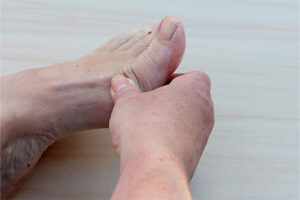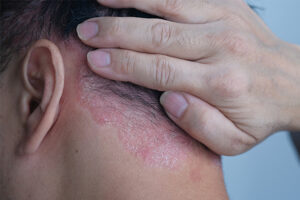Dermatology
Plaque Psoriasis
Challenges in the Management of Scalp Psoriasis
Overview
Plaque psoriasis of the scalp, also known simply as scalp psoriasis, is a common condition that may be difficult to treat. Our featured expert explains.
Expert Commentary
Steven R. Feldman, MD, PhD
|
|
"Adherence to topical therapy for psoriasis, in general, is abysmal, and it tends to be even worse for scalp psoriasis."
Although quite common, scalp psoriasis is considered to be difficult to treat, much like psoriasis affecting the face and intertriginous areas. Dogma suggests that scalp psoriasis can be resistant to topical treatments because of poor penetration through the thick scales; however, a normal scalp has a weak barrier that is similar to the axilla, and barrier function is far weaker in diseased skin. Another dogma is that scalp psoriasis is difficult to treat because patients "koebnerize" the scalp by scratching; however, patients may scratch all of their psoriasis, so it is likely that other factors also make scalp psoriasis difficult to treat.
In my experience, the biggest challenge associated with the management of scalp psoriasis is poor adherence to topical agents. Many patients do not take pills well, and using topicals on the elbows and knees is much harder than taking a pill. But treating hair-bearing scalp may be the mother of all adherence problems. Topical agents can be challenging to use on the scalp because application in the hair may be very burdensome and/or cosmetically unfavorable. Adherence to topical therapy for psoriasis, in general, is abysmal, and it tends to be even worse for scalp psoriasis.
Ultimately, since poor adherence to topical treatments is such a significant challenge in the management of scalp psoriasis, there needs to be an emphasis on improving patient adherence. One approach is to hold patients accountable, which can be done by shortening the time horizon for follow-up. Planning some type of follow-up with patients 3 to 4 days after they start a new treatment—whether in person, over the phone, or over an electronic portal—is a strong encouragement for patients to fill the medication and to use it well.
When faced with “treatment-resistant” psoriasis, clinicians might be tempted to prescribe multiple different topical medications simultaneously. Although such an approach may seem optimal, as each additional topical medication that is added to the treatment regimen may help address additional causes of psoriasis pathology, I believe that complex treatment regimens are likely to be counterproductive. Each additional topical medication that is added to the treatment regimen makes the regimen more complicated and almost certainly worsens treatment adherence. Combination products (eg, vitamin D in combination with steroids) allow for the simplification of treatment and may therefore be preferable to multiple different products; in my experience, however, even combination products may not be needed. Getting patients to use 1 medication well (eg, a strong topical corticosteroid such as clobetasol) may be all that is needed.
Several vehicles and medications are available, so patients have choices for treating their scalp psoriasis topically. I think that there is one vehicle that works better than all of the others, and that is the one that a particular patient wants to use. When prescribing an alcohol-based solution or a foam product that is going to sting, telling patients that the stinging is a sign that the medication is working may help them adhere to the treatment. Additionally, for patients with a lot of hair, having a second person involved in the application of the medication may be very helpful, if not essential. A good application of a topical treatment to the scalp is like getting someone's hair colored; the helper can separate the patient's hair to the roots, see the affected areas of the scalp, and apply the medication directly to the scalp. Medication that is applied to the hair may just be wasted.
When topical therapy is not working for scalp psoriasis despite attempts made by the clinician to improve adherence, a systemic drug may be considered. There are sufficient efficacy data for a number of systemic agents, including interleukin-23 and interleukin-17 blockers, as well as apremilast and tumor necrosis factor inhibitors. Any of these agents can be used for patients with scalp psoriasis; these treatments tend to be just as effective for the scalp as they are for other body areas. Scalp psoriasis is not as resistant to treatment as clinicians and patients may think. Rather, treatment success is often a matter of success with patient adherence.
References
Alsenaid A, Ezmerli M, Srour J, et al. Biologics and small molecules in patients with scalp psoriasis: a systematic review. J Dermatolog Treat. 2022;33(1):473-482. doi:10.1080/09546634.2020.1770167
Camela E, Ocampo-Garza SS, Cinelli E, et al. Therapeutic update of biologics and small molecules for scalp psoriasis: a systematic review. Dermatol Ther. 2021;34(2):e14857. doi:10.1111/dth.14857
Merola JF, Qureshi A, Husni ME. Underdiagnosed and undertreated psoriasis: nuances of treating psoriasis affecting the scalp, face, intertriginous areas, genitals, hands, feet, and nails. Dermatol Ther. 2018;31(3):e12589. doi:10.1111/dth.12589
Narcisi A, Valenti M, Cortese A, et al. Anti-IL17 and anti-IL23 biologic drugs for scalp psoriasis: a single-center retrospective comparative study. Dermatol Ther. 2022;35(2):e15228. doi:10.1111/dth.15228
Papadimitriou I, Bakirtzi K, Katoulis A, Ioannides D. Scalp psoriasis and biologic agents: a review. Skin Appendage Disord. 2021;7(6):439-448. doi:10.1159/000517806
Schlager JG, Rosumeck S, Werner RN, et al. Topical treatments for scalp psoriasis: summary of a Cochrane Systematic Review. Br J Dermatol. 2017;176(3):604-614. doi:10.1111/bjd.14811
Wang T-S, Tsai T-F. Managing scalp psoriasis: an evidence-based review. Am J Clin Dermatol. 2017;18(1):17-43. doi:10.1007/s40257-016-0222-4











